Department of Classics
Archive
-
2023
The 2023 ORALi-Tea took place at Bryn Mawr on March 22,2023.
-
2021
The 2021 ORALi-Tea took place at Haverford College.
-
2020
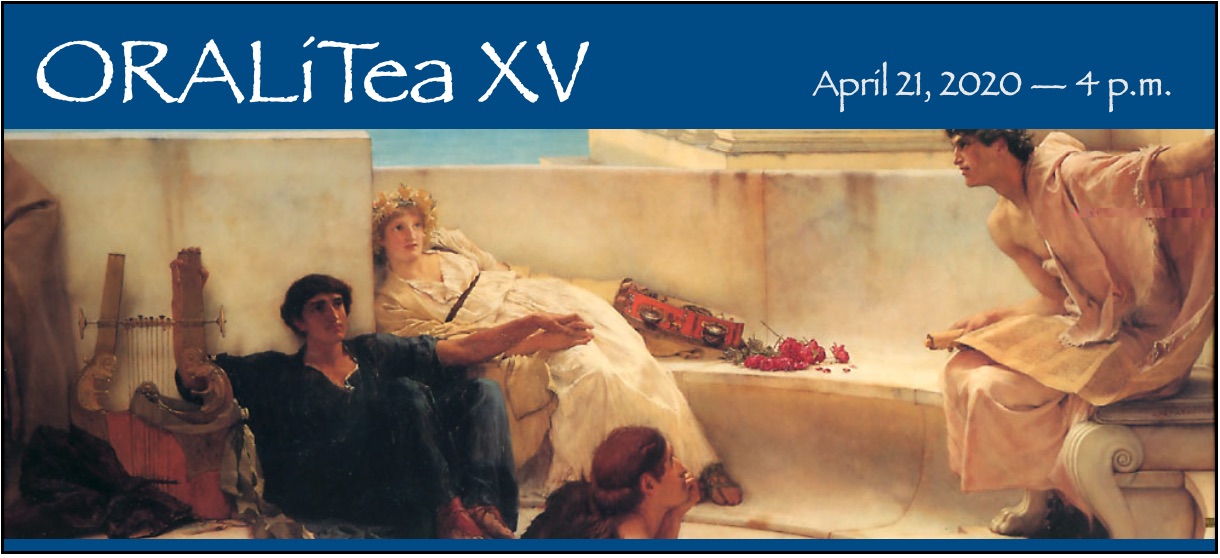
Sophias
Bryn Mawr Night Owls
Aristophanes’ Acharnians, 17–39 (abridged)
Matt Farmer, Joshua Bayona, Hannah Kolzer, Ilana Lehrman, Grace Morton, Felix Qin, Andrew Zolensky
Testamentum Porcelli
“A Piglet’s Last Will & Testament”George Doehne, Kristen Min, Ellie Kearns, Cate Farrell, Felix Qin, Bret Mulligan
Ovid, Heroides 7.65–102
Bret Mulligan, Nico Tripeny, Shriya Fruitwala, Isabel Martin, Grayson Toole, Cerise Yau, Rebecca Koweek, Ella Namour, Sam Lowenstein
Medea, Euripides 230-251
Alix Galumbeck, Alice Nicholson, Eve Rui, Jack Fanikos, Devin Lawson, Hope Johnson, Grace Salzeider
Homer, Iliad Book XXII 361-363
Aeschylus, Prometheus Bound 1091-93
Oliver Hughes
Horace, Odes 1.9 (Soracte)
Elise Thompson
Pliny, Epistulae 6.20 (Vesuvius Day)
Eden Pleasure-Kranowitz, Sophie Frem, Yuxuan Sun, Junior Nguyen, Alex Stern, Yikang (Bailey) Li, Andrew Aarth, Andreanna Papatheodorou
CATullus 5
Ella Wiborg, Emily Aguilar, Elizabeth Hamilton,
Julia Billera, Allison Eckert, Marion Hamilton, Layla Fistos, Mary Somerville, Olivia Hopewell
Gaudeamus Igitur
Universitat Oberta de Catalunya
-
2019
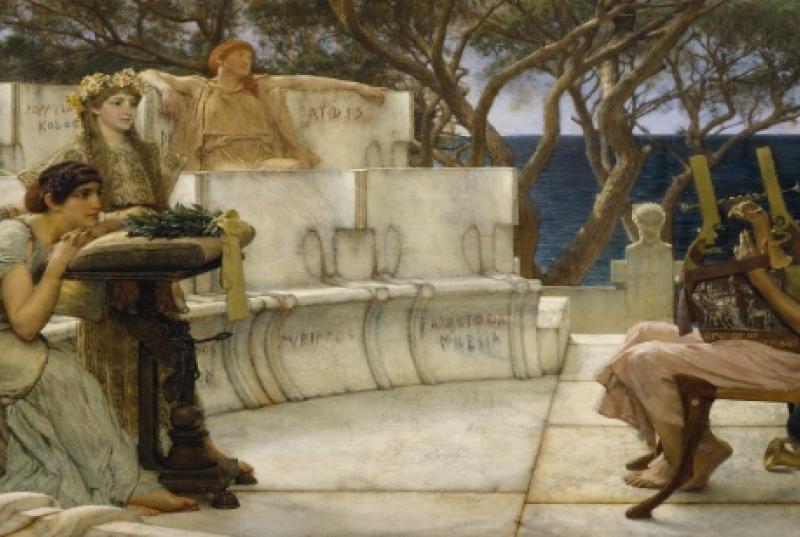
Sophias
Catullus 13
Emily Aguilar, Ella Wiborg, Allison Eckhert, Elinor Berger, Mortimer Cavanah
Tyrtaeus 11
Helena Crusius, Em Groves, Anna Shuff, Charlotte Skolasky, Asya Sigelman
Sophocles, Antigone (544-560)
Emily Schalk, Juliette Choi
Sophocles, Antigone, Parodos (101-126)
Elia Anagnostou
Sophocles, Antigone, “Ode to Man” (354-375)
Alex Tucker
Euripides, Medea 1361-1414
Jenni Glaser, Molly Kuchler
Zosimus, On Excellence III, i, 11 B = MA 10.2
Horace, Odes 4.7
Rad Edmonds
Caroline Andersen, Catie Beveridge, Tia Brown, Yvanna Cajina, Ethan Gadra, Sam Lowenstein, Anne Tobin, Nico Tripeny
Euripides, Cyclops 316-46
Catullus 101
Boethius 1.2, selections (Latin & Old English)
Chaldean Oracle, frag. 96, 147, 148
Corderius, Colloquia 2.3
Matt Farmer
Catherine Conybeare
Alex Tucker, Wynter Douglas
Alex Tucker
Gwynne Dulaney, Katie Bradley
Cicero, In Catilinam, Opening
Francisco J. Cabrera, Joannae Virginis Laudes (1–6, 311–325)
Sor Juana Inés de la Cruz
Homer, Iliad XVI 407-481
Carter Langen
Bret Mulligan
Bret Mulligan
Ana Alvarez, Sofia Esner, Alix Galumbeck, Alice Nicholson, Grace Salzeider, Maggie Sawyer, Eve Rui
Aeschylus, Agamemnon, 1372-98
Catullus 85 and 104
Apuleius, Metamorphoses 3.21 and 3.24
Greek Anthology: Riddles 64, 103, and 105
“Mamma Mia” (in Greek!)
Deborah Roberts
Rachel Brodie
Carter Langen, Claire Blood-Cheney, Dylan Dixon, Erica Launang, Joshua Bayona, Kai-Ling Su, Nicholas Conroy, Paul Soulanille, Rachel Brodie, Will Lawrence
Maggie Doubman and Turner Johnson
Alix Galumbeck, Emily Schalk, Tatiana Perez, Sashini Kannan, Wynter Douglas
Gaudeamus Igitur
-
2018

Sophias
Everyone! (more likely just the Mawrters)
Homer, Odyssey 11 (Selections)
Alex Tucker, Leah Borquez, Kei Davey, Emily Schalk, John Burgess
Vergil, Aeneid 1.588-610
Steve Gan
Aeschylus, Prometheus Bound 436-506
Vaidehi Agarwalla, Alice Healey, Ava Douglas, Kate Edwards, Mary Sweeney, William Edwards, Juliette Choi, Margaret Stretcher, Deborah Roberts
Cicero, Phillipicae 2.67-69
Carter Langen, Pranav Krishnan, Gene Perry
Petronius, Poem 81
Phebe Du Pont
Cicero, In Catilinam 1.15-16
Andrew Lee, Dennis Grencewicz
Plutarch’s Gryllus (selections)
Aarushi Mohan (Gryllus), Hannah Davis (Circe), Oliver Hughes (Odysseus), a chorus of supporting piggies: Fiona Kegler, Hope Johnson, Tomas Paris
Phaedrus 4.10 & 5.8
Claire Blood-Cheney
Plato, Phaedrus 255d-e
Joshua Shaw
Plautus, Mostellaria 470-507
Louisa Stoll, Jackson Meyer-Lee
Horace, Odes 1.37
Wynter Douglas, Hope Johnson, Alice Nicholson, Eve Rui
Revelation of John 22:1-5
Ana Alvarez, Emily Darrow, Alix Galumbeck, Alice Nicholson, Eve Rui, Grace Salzeider
Horace, Epodes 2 (selections)
Yuchao Wang
Anonymous, A Storm in Devon
Alex Tucker
Plato, Phaedrus 236b5-e5
Cristian Espinoza, William Edwards
Gaudeamus Igitur
Omnes!
-
2017
Aeschylus, Eumenides 321-346
Deborah Roberts, Hannah Silverblank, Annette, Baertschi, & Asya Sigelman
Homer, Iliad
Greek 102 students
1.172 - 222 Theognis, Selections
Emily Schalk, Clara Wright, Kristina Koskores, Emily-Rose Ogland, Audrey Wallace, & Kate Edwards
Euripides, Bacchae (selections)
Anna Mayersohn, Kevin Jin, Zakery Oglesby, & Andrew Harris
Aesop, “The Fox and the Ape”
John Burgess, Alex Tucker, & Charlie Kuper
Ovid Metamorphoses III (selections)
Ava Douglas (video)
Catullus 5
Joyce Chan
Sappho 31
Leah Grams
Catullus 51
Leah Grams
Vergil, Aeneid 6. 305-312
Oliver Hughes
Alypius’ entry from the Menologion of Basil II
Charlie Kuper
Horace, Odes 3.9
Sage Farha & Mary Somerville
Horace, Odes 1.11
Kate Edwards
P. Porcium Poetam, “Pugna Porcorum”
Bret Mulligan
Horace, Odes 4.7
Bret Mulligan
A.A. Milne, Winnie Ille Pu
James Faville
“Mundus Mirabilis”
Margaret Stretcher
-
2016
Sophias
Everyone! (more more likely just the Mawrters)
Selections from Homer, Iliad
Pam Gassman, Will Edwards, Kevin Jin
Fable-icious I: Rana inflata
Professor Mulligan
Aeschylus, Prometheus Bound 877-963
Julie Benton, James Burvant, Honglan Huang,
Chris Lichtenstein, Carman Roman, Professor RobertsCatullus 46
Lillian Roberts and Eliana Chavkin
Scholasticus Jokes
Margaret Stretcher, Jake Kwon, Andrew Chalfoun, Sharim Jones
Tyrtaeus 11
Anita Brown, Juliette Choi, Ava Douglas, Claire Gaposchkin, Briana Grenert, Megan Salazar
Horace's Odes 1.9
Mary Sweeney and Andrew Nguyen
Pindar Pythian 8.88-100
Elizabeth Erikson
Horace's Odes 2.14
James Faville
Scholasticus Jokes
Margaret Stretcher, Jake Kwon, Andrew Chalfoun, Sharim Jones
Petronius, Satyricon 48.4-8
Cristian Espinoza, Katharine Haldeman, Chris Lichtenstein, Wanhong Zou
Zosimus, On Excellence III.1.11b
Professor Edmonds
Terence, Eunuch 342-381
Anna Mayersohn and Rosalind Xu
Gaudeamus Igitur
Omnes!
-
2015
The 2015 Orali-tea took place at Bryn Mawr.
-
2014
Program
Opening song: “Sophias”
Homer, selections from Odyssey 11
Radcliffe Edmonds, Christ Lichtenstein, James Burvant, Sophie Mankins, Lillian Roberts, Tabatha Barton, Anna Sargeant
Sappho, “Hymn to Aphrodite”
Tabatha Barton, Vanessa Felso
Aeschylus, Prometheus Bound 943-982
Zoe Fox, Emma Mongoven
Sophocles, Philoctetes 730-767:
Vanessa Felso, Deborah Roberts
Aristophanes, Clouds 218-234
Julie Benton, Tianmin Cheng, Meredith Scheiring
Plato, Apology 22A-C
Collin Hilton
Terence, Adelphoe, 68-77, 489-99, 610-21
Abi Corcoran, Carman Romano, Hannah Weissman
Seikilos, Epitaph
James Faville
Seneca, Thyestes 885-907
Tabatha Barton
Quintilian 8.6.59-64
Robert Germany
Mater tua
Anna Mehta, Sapientia Randazzo, Carman Romano, Kim Conrad, Zak Oglesby, Andrew Dalke, Eric Goodman, Jake Youse
A.E. Housman, “Fragment of a Greek Tragedy”
assorted faculty
Closing Song: “Gaudeamus Igitur”
-
2013
The 2013 Orali-tea took place at Bryn Mawr.
-
2012
The Seventh Annual ORALi-Tea was held on April 22, 2012 at Haverford College
Program
Opening song: “Sophias”
Selections from Iliad 1: a Dramatic Performance
Sasha Agins
Amelia Eichengreen
Zoe Fox
Matt LiscovitzPropertius 2.15, 31-40
Bruce Leto
Hesiod, Theogony 684-99, 715-20
Tabatha Barton
Scenes from Plautus, Menaechmi:
Harris Rothman
Austin Boyle and Florencia Foxley
Eliana Kohrman-Glaser, Rogelio Lopez, Stephanie Wolfson
Lindsday Parrish and Stephen Michael
Marielle Boudreau and Alyssa Grossweiner
Matt Holmes, Quinn Harding, Emma MongovenTyrtaeus 11
Tabatha Barton
Vanessa Felso
Eleni Gizas
Raija Heikkila
Monica Quinones-Rivera
Rachel TenpennyOvid Amores 2.4, selections
Jacob Horn
J.K. Rowling (trans. Peter Needham), Harrius Potter et Philosophi Lapis, opening
Michael Rushmore
Epigrams and Riddles
Courtney Asare
Eliana Kohrman-Glaser
William Leeser
Jenna McKinley
Stephen Michael
Emma Mongoven
Whitney Mueller
Catherine WenVergil, Aeneid 4.1-29
Vanessa Felso, Anna Sargeant
Caesar, De Bello Gallico 1.24-25
Tom Zhuang
Baruch Spinoza, De Deo
Sam Hersh
Sir Isaac Newton, Philosophiæ Naturalis Principia Mathematica
Erica Hopkins
Sophocles, Antigone: First Stasimon and lines 531-526
Asya Sigelman
Florencia Foxley
Anna Merriman
Deborah RobertsLucretius, De Rerum Natura 1.1-9, 418-29
Henry Bradford
Jade AndradeLivy, Ab Urbe Condita XXX 30.18
Marc Korobkin
Closing Song: “Gaudeamus Igitur,” verses 1 and 2
-
2011
Held at Bryn Mawr.
-
2010
The Fifth Annual ORALi-Tea was held on April 15th at Haverford College
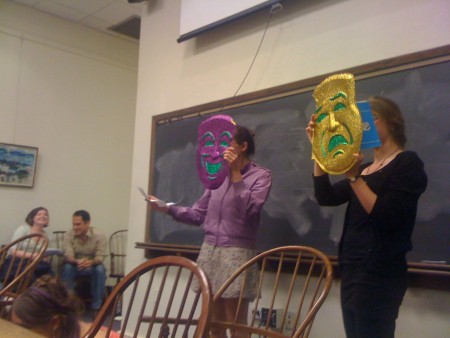
We are delighted to report that the fifth annual Bi-College ORALi-Tea, an evening for the Oral Reading of Ancient Literature and (also oral) consumption of dessert, was as a raging success.
Gest 101 was again fulled to capacity, as students and faculty enjoyed a selection of works performed in their original languages. In a program heavy with Homeric Hymns and Plautus' Pseudolus, there was singing, tasty desserts, and of course great literature and performances.
Program
Sophias
Bryn Mawr Students
Selections from the Homeric Hymns
Clare Amari
Maddy Court
Luce Echegarri
Annalee Garrity
Anna Merriman
Minerva Pinto
Hannah Slavitt
Emily Strong
Radcliffe EdmondsSelections from Aeschylus, Sophocles, John 1
Matthew Forster
Florencia Foxley
Benjamin WalkerSelections from Euripides, Medea
Emily Bergbower
Rachel Carter
Lara Pollack
Mark Cavanagh
Deborah RobertsSelections from Plautus, Pseudolus
Stefani Wallace
Jacob Horn and Robert Germany
Gabrielle Goodman, Hannah Silverblank, and Juliet Woods
Sarah Harrison
Kersti Francis, Elizabeth Olecki, and Jen Rajchel
Amelia Eichengreen, Annalee Garrity, and Frances Glick
Benjamin Walter
Meghan Ryan
Rachel Faulks, Stephanie Martin, and Hannah Roos.Catullus 46
Rachel Carter
Horace 1.13
Allyson Bunch
Ovid, Ars Amatoria III.99-136
Bret Mulligan
Singing of “Gaudeamus Igitur”
-
2009
Held at Bryn Mawr.
-
2008
The Third Annual ORALi-Tea was held on April 24th at Haverford College

We are delighted to report that the third annual Bi-College ORALi-Tea, an evening for the Oral Reading of Ancient Literature and (also oral) consumption of dessert, was as a success. Gest 101 was full to capacity, as students and faculty enjoyed over a dozen ancient works performed in their original languages. There was singing, tasty desserts, and of course great literature and performances.
Program
Sophias
Bryn Mawr Students
Sophocles, Oedipus Tyrannos 1149–1222
Willy Lebowitz
Emily Olsen
Greg Potestio
George Reuter
Naomi Sharlin
Kiersten Spongberg
Sarah StefanskiSappho 1
Erika Carlson
Homer, Odyssey 1.337–349
Mara Miller
Homer, Odyssey 2.85–95
Cassie Gafford
Some Very Old Jokes
Ben Brock
Mark Cavanagh
Becca Morgan
Asher Reisman
Lara PollackPlato, Euthyphro 3e7-4a11
Emily Bergbower & Mary Florence Sullivan
Pindar, Olympian 11
Emily Olsen & Sarah Stefanski
Amores 2.18
Mark Cavanaugh
Ovid, Ars Amatoria 2.23–27, 31–38, 47–96
Bret Mulligan
Propertius 4.7.1–12, 93–94
Louisa Foroughi
Tacitus Histories 2.49
Deirdre Lloyd
Horace, Odes 4.7
Deborah Roberts
Gaudeamus Igitur
Omnes
-
2007
The Second Annual ORALi-Tea was held on April 19th at Bryn Mawr College
We are delighted to report that the second annual Bi-College ORALi-Tea, an evening for the Oral Reading of Ancient Literature and (also oral) consumption of dessert, was as successful as the inaugural event. The Quita Woodword room was full to capacity, as students and faculty enjoyed over a dozen ancient works performed in their original languages. There was singing, tasty desserts, and of course great literature and performances.
Program
Sophias
Emily Lewis, Sarah Stefanski, Emily Olsen, Erika Carlson
Aristophanes, Frogs 209-268
Johanna Best
Molly Higgins-Biddle
George Reuter
Lauren ZimmermanHomer, Iliad 6.144-177
Willy Lebowitz
Aristophanes, Clouds 1085-1105
Matthew Farmer & Sean Mullin
Sappho 1
Professor Roberts
Enigmas from the Greek Anthology
Emma Buckingham
Cassie Gafford
Mara Miller
Jeff Wildermuth
Amber ZambelliCatullus 8
Erika Carlson
Catullus 13
Katerine Murtha
Cicero, Pro Caelio 32-34
Emily Lewis
Horace, Odes 1.19
Annamarie Cugini
Horace, Odes 3.18
Charlotte Trautman
Horace, Odes 2.10
Celia Weaver
Statius, Silvae 2.5
Emily Olsen
Sarah Stefanski -
2006
The Inaugural ORALi-Tea was held on April 6th at Haverford College
We are delighted to report that the inaugural Bi-College ORALi-Tea, an evening for the Oral Reading of Ancient Literature and (also oral) consumption of dessert, was a rip-roaring success. Nearly 50 people packed in to Gest 101 (including a legatio from Swarthmore College) to experience over a dozen (mostly) ancient works performed by students and faculty. There was singing, a bit of dancing (by faculty, so the brevity was for the best), chocolate cake, and of course great works of literature. All in all, a fantastic evening.
Program
Sophias
Claire Collins, Emily Lewis, & Elizabeth Shaw
Ask Mr. Menander
Greg Potestio
David Hartmann
Xander Subashi
Isabel ClarkeSappho 102
Emily Lewis & Elizabeth Shaw
Homer, Odyssey 1.32–47
Willy Lebowitz
George Reuter
Evan RodriguezEuripides, Medea 410–430
Christine DeStephan
Molly Higgins-Biddle
Professor Deborah RobertsPlato, Symposium (selection)
Andrew Mihailoff
Demosthenes, On the Crown 3–4
Sean Mullin
Petronius, Satyrica 55
Professor Bryce Walker
Martial 5.58
Professor Bret Mulligan
Horace, Odes 1.24
Arianae Tsavaris
Horace, Odes 1.4
Deirdre Lloyd
Juvenal 5.156–173
Jacob Carroll
Persius 3.88–118
Claire Collins
Housman, Fragment of a Greek Tragedy
Professors Edmonds, Mulligan, Roberts, and Walker
Vergil, Aeneid 2.571–586
Katie Baratz
Gaudeamus Igitur
Omnes
Marathon
- 2022: Euripides’ Medea
-
2020: Classical Reception in Early Modern & Contemporary Black Poets
Phillis Wheatley (1753-84)
Phillis Wheatley, the first African-American poet to have her work published, was born in Africa; in 1761 she was brought on a slave ship to Boston and bought by the Wheatley family. In their household she learned to read and write, began the study of Latin, read extensively in English literature, and began writing poetry in her teens. A volume of her poems was published in London in 1773, and she was freed soon after. Other poems appeared in newspapers and pamphlets; many are lost, since a plan for a second book fell through.
Countee Cullen (1903-1946)
Countee Cullen played a central role in the Harlem Renaissance, publishing poetry, plays (including a translation of Euripides’ Medea with an added prologue and epilogue), a novel, and several children’s books. Ηe lived and worked in both France and the U.S., and was a supporter of other Black writers including the young James Baldwin.
Gwendolyn Brooks (1917-2000)
Among the most highly regarded American poets of the 20th century, Brooks was the first Black author to win the Pulitzer Prize and the first Black woman to hold the office of “poetry consultant” to the Library of Congress; she was also poet laureate of Illinois. Her publications include the poetry collections A Street in Bronzeville, Annie Allen (from which “The Anniad” is taken), and In the Mecca, as well as the novel Maud Martha.
- Selections from “The Anniad”
Derek Walcott (1930-2017)
Saint Lucian poet and playwright, whose numerous awards include the Nobel Prize in Literature, a MacArthur Foundation Genius Award, a Royal Society of Literature Award, and the Queen’s Medal for Poetry. His publications include the poetry collections 25 Poems, In a Green Night, Tiepolo’s Hound, The Prodigal, White Egrets, and Morning, Paramin, the epic poem Omeros, and the play Dream on Monkey Mountain.
- Selections from poems including: “Sea Grapes,” “Map of the New World,” “Roman Outposts,” “Greece,” “Hotel Normandie Pool,” “Midsummer XXXIV” “White Magic” “Italian Eclogues I”
Rita Dove (1952-)
American poet and playwright, whose awards include the NAACP Image Award, a Fulbright scholarship, the Pulitzer Prize, and a National Humanities Medal. Her many works include the novel-in-verse Thomas and Beulah, poetry collections On the Bus with Rosa Parks and Sonata Mulattica, and the play The Darker Face of the Earth.
- Selections from Mother Love (Demeter/Persephone)
- Selections from Museum
Wesley Enoch (1969-)
Wesley Enoch, playwright and artistic director, grew up in Brisbane. He has been artistic director at a number of companies, starting with Kooemba Djarra Indigenous Performing Arts and most recently at Queensland Theatre Company. His play The Story of the Miracles at Cookie’s Table won the Patrick White Playwright’s Award.
- Selection from Black Medea
Donika Kelly (1982-)
Assistant Professor of Creative Writing at Bonaventure University and author of the poetry collections Aviarium and Bestiary. Kelly has won the Cave Canem Poetry Prize, the Hurston/Wright Award, and the Kate Tufts Discovery Award, as well as being long-listed for a National Book Award and a finalist for the Lambda Literary Award.
- Selections from Bestiary
Ishion Hutchinson (1983-)
Born in Port Antonio, Jamaica, Ishion Hutchinson is the author of two poetry collections, Far District and House of Lords and Commons. Awards and honors include National Book Critics Circle Award for Poetry, Guggenheim Fellowship, the Whiting Writers Award, the PEN/Joyce Osterweil Award, the Joseph Brodsky Rome Prize and the American Academy of Arts and Letters Award in Literature. He is an associate professor of English at Cornell University.
- Selections from Far District
- Selections from House of Lords and Commons
Inua Ellams (1984-)
Nigerian poet, playwright, and performer, whose publications include the poetry collections Candy Coated Unicorns and Converse All Stars, Thirteen Fairy Negro Tales, the Wire-Headed Heathen, #Afterhours, and the verse epic The Half-God of Rainfall, as well as the play The 14th Tale. Ellams is an ambassador for the Ministry of Stories and a Fellow of the Royal Society of Literature, and has been awarded the Liberty Human Rights Arts Award.
- Selections from The Half God of Rainfall
Nabila Lovelace
American poet, author of the poetry collection Sons of Achilles. She has won the Poets & Writers Amy Award, and been a finalist for numerous awards including the Poetry Witch Magazine Summer Sοlstice Bop Contest and the Vinyl 45 Chapbook Contest. Her poetry has been published in Narrative Northeast and Washington Square Review, and she is a poetry editor at Black Warrior Review and The Offing.
- Selections from Sons of Achilles
Nicole Sealey
Born in St. Thomas (USVI) and raised in Florida, Sealey is an award-winning poet and director of the Cave Canem Foundation. Her many awards include the Rome Prize and the Drinking Gourd Chapbook Poetry Prize; she has taught at The City College of New York, Boston University, and Princeton University.
- Selections from Ordinary Beast
-
2019: Aristophanes’ Birds

Classics is the study of the ancient Greek and Roman world, its languages, its cultures, and their impact on later cultural traditions.
Our evolving understanding of these concepts (e.g. "ancient," “culture,” “Roman”) gives our discipline dynamism, while a common body of texts function as its shared center. Classics is also interested in how later peoples understood and transformed this inheritance, generating the rich Classical tradition in literature and the other arts.
The Department of Classics at Haverford embraces the interdisciplinary study of any and all aspects of ancient Greek and Roman cultures. Our courses also invite students to explore the people, ideas, and works that Greek and Roman antiquity inspire, influence, and shape throughout time and around the world. The Department offers courses in ancient history, literature, and culture in English translation; as well as courses in Greek and Latin language and literature at all levels.
Interesting in learning more about the world of Aristophanes’ Birds? Consider signing up for Elementary Ancient Greek this spring: it’s the only language in the BiCo you can start in the spring semester! Greek and Latin both fulfill the foreign language requirement.
Already enjoying a course in the department? Why not consider one of our many majors or minors! Speak with any member of the department for more details!The Play
Aristophanes’ comic masterpiece Birds premiered in Athens in 414 BCE, a time of great tension and turmoil in the city. After a brief period of peace, the war with Sparta was heating up again; Athens had just dispatched a major invasion force to fight a proxy war in Sicily, and the Athenians did not yet know the humiliating disaster this expedition would become. A group of prominent citizens had recently been accused of engaging in an elaborate act of blasphemy, and the full extent of the conspiracy to desecrate certain icons of Athenian religion was not yet known. Athens’ last great leader, Pericles, had been dead for more than fifteen years, and a series of increasingly corrupt demagogues had arisen to take his place, leading the city deeper and deeper into an unnecessary conflict with Sparta that Athens would eventually lose.
In Birds, two Athenian citizens, Peisetaerus (“Companion-Persuader”) and Euelpides (“Son of Good Hope”) decide they’ve finally had enough. They flee Athens’ troubles, its litigious citizens and misguided leaders, and set out to find a perfect city somewhere else. They track down the mythological King Tereus, who they know from a recent tragedy by Sophocles has been turned into a bird, reasoning that a bird-man will have traveled broadly and can help them identify the perfect place to live. Their plans abruptly change, however, when Peisetaerus decides instead to found a new city up in the sky among the birds: Nephelokokkygia, “Cloud-Cuckoo-Land.” Will it be the utopia these ex-Athenians were searching for – or have they brought all their Athenian problems with them?
-
2018: Homer's Odyssey

A participatory reading of the epic poem in Emily Wilson’s new Translation
October 3, 2018
VCAM
9:30 am until odysseus is Safe at home
featuring a Lunchtime conversation with the translator -
2017: Prometheus Bound
This year, as part of the Classics Department’s biennial series of informal (and unrehearsed) staged readings, alternating with all-day marathon drop-in reading of longer works, we present a reading of a Greek tragedy from the fifth century B.C.E., Prometheus Bound.[1] This play has come down to us as one of seven surviving tragedies by the playwright Aeschylus, although some believe it was in fact written by someone else, perhaps Aeschylus’ son; it was probably part of a trilogy whose other plays are lost. The play is set in the world of the gods, in the aftermath of the war between the Olympian gods and their predecessors, the Titans; its central character is the Titan Prometheus, who in an act of resistance to Zeus, king of the Olympians, stole fire from the gods, gave it to human beings, and was cruelly punished. Prometheus Bound dramatizes a part of the myth of Prometheus that falls immediately after the theft and looks backward and forward to other events. Chained and fastened to a crag in an uninhabited wilderness, the god encounters a series of visitors and takes them traveling through distant regions and into past and future as he tells his own story, tells and hears the stories of others, and hints at dangerous knowledge that may lead to the fall of Zeus.
Characters, in order of appearance, and cast:
Kratos: force personified Hannah Davis
Prometheus the Titan James Faville
Hephaestus, god of craft and metalwork Jake Kwon
The Daughters of Ocean (chorus) Tomas Butelman, Catherine Conybeare, Radcliffe Edmonds, Mairead Ferry, William Fox, Charlie Kuper, Carter Langen, Bret Mulligan, Deborah Roberts, Hannah Silverblank, Yuchao Wang, Katheryn Whitcomb
Ocean, another Titan Margaret Stretcher
Io, a young woman mistreated by Zeus and Phebe du Pont
turned to a cow
Hermes, messenger of Zeus Cristian Espinoza
Sponsored by the Department of Classics, the Hurford Center for the Arts and Humanities, and VCAM
[1] In the translation by Deborah Roberts, Hackett 2012, used by permission of the publisher.
-
2016: Horace’s Odes

Wednesday November 16, 2016 9:15 am until we run out of Horace
Sunken Lounge, HC Dining Center
-
2015: Aristophanes’ The Clouds

The Haverblog: The Clouds: Classics Marathon 2015
A staged reading of Aristophanes’ comedy
The Cloudstranslated by Peter Meineck*
Synopsis
The play begins with Strepsiades bemoaning the debts accumulated by his profligate and athletic son, Pheidippides. But Strepsiades has a plan: to send his son to college (aka “The Pondertorium”) where he can learn rhetorical tricks that will allow them to weasel out of their debts. When Pheidippides refuses, Strepsiades enrolls. Impressed by the obscure knowledge the students have mastered, Strepsiades begs an audience with Socrates, who agrees to make him the greatest orator in Greece. A chorus of clouds appears and praises the play and the playwright. After Strepsiades fails in his studies, Pheidippides agrees to enroll. Inferior Argument defeats Superior Argument in a debate and begins to train Pheidippides, who is transformed into a nerd. Strepsiades, confident that his newly educated son will allow him to avoid his debts, contemptuously dismisses his creditors. When Pheidippides refuses to help and instead beats Strepsiades (!), Strepsiades leads an armed mob against the college.
Cast
Strepsiades, a rural Athenian: James Burvant
Pheidippides, son of Strepsiades: Carman Romano
Houseboy & Xanthias, servants of Strepsiades: Bret Mulligan
Students of Socrates: Julie Benton, Robert Borek
Socrates, a philosopher: Zakery Oglesby
Superior Argument: Jai Nimgaonkar
Inferior Argument: Nick Barile
First creditor: Ceci Silberstein
Second creditor: Bill Tortorelli
Chaerephon a philosopher: Andrew Eaddy
Chorus leader: Radcliffe Edmonds
Chorus A: Julie Benton, Andrew Eaddy, Radcliffe Edmonds, Bret Mulligan
Chorus B: Robert Borek, Deborah Roberts, Ceci Silberstein, Bill Tortorelli*used by permission of Hackett Publishing.
-
2014: Homer's Iliad
This year's all-day participatory marathon went on from 8 am until 8 pm for which students, faculty and staff could sign up in advance or join in spontaneously at the event. The marathon brought together a range of students and faculty, including President Dan Weiss.
-
2013: Seneca's Medea
Seneca's Medea, on Wednesday Nov. 6 , 2013 at 7:00 PM in the DC
- Jason: James Faville
- Medea: Marielle Boudreau
- Nurse: Alison Robin
- Creon: Zak Oglesby
- Messenger: Shayna Slininger (Also in the chorus)
- Chorus: Kiran Rajamani, Emma Mongoven, Hannah Weissman, Amanda Robiolio, Amelia de Angelo, Joseph Le Roux, Fran Gascoigne, Gus Heilbock and assorted faculty members.
-
2012: Apuleius' Metamorphosis or The Golden Ass
Apuleius' Golden Ass. Intende Lector!
For our 7th annual Classics Marathon, faculty and students gathered on October 26 for a participatory reading of Apuleius' Golden Ass or Metamorphosis, a Latin text of the 2nd century C.E. and one of the oldest novels in the western literary tradition. Apuleius' narrator tells the tale of his transformation into a donkey and his subsequent adventures: the main narrative and the numerous stories it incorporates offer us a mélange of adventure, comedy, horror, fairy-tale, social satire, and religious epiphany.
Apuleius concludes his prologue with the words lector intende: laetaberis ("Reader, pay attention: you'll have fun"). We invite you to share in the fun. Would-be readers (no experience needed) can drop in any time and take a turn. Listeners are also welcome.
-
2011: Aristophanes' Lysistrata
Aristophanes' Lysistrata. No Peace for Athens!?! No Sex for You!
For our sixth annual Classics Marathon, faculty and students gathered on October 26 for an unrehearsed staged reading of Aristophanes' Lysistrata.
Synopsis
Athens has been at war for many years with other Greek city-states. As the play begins, Lysistrata, a young married woman, has summoned women both of Athens and of her current enemies to a meeting. When they arrive, she reveals her plan: to carry out a sex strike, in which no woman will sleep with her husband until the men stop the war. The woman are at first reluctant to make such a sacrifice, but she persuades them, and they take an oath.
Meanwhile, the women of Athens have taken over the Acropolis. The chorus of old men arrive with firewood and torches to besiege them; they are confronted by the chorus of old women, armed with jars of water to put our their fire. A class ensues.
The Councilor (an Athenian official) arrives accompanied by Scythian guards (the police force of Athens) and slaves with crowbars, and tries to dislodge the women. Lysistrata and several old women successfully resist him; this scene is followed by another angry exchange between the two choruses.
Several days later, Lysistrata emerges to express concern: women are unwilling to hold out any longer, and several have run away. Three more now make the attempt. This episode is followed by a scene in which the Cinesias, husband Myrrhine, one of the women on the Acropolis, arrives with their baby to beg her to come back; he is obviously starved for sex (as indicated in the original production by a large phallus), and she appears willing to accommodate him – at first.
Now a herald arrives from Sparta, like Cinesias in desperate condition. He and Cinesias talk, and the herald agreed that Sparta will send ambassadors to arrange a treaty. In the wake of this move towards peace, the two choruses reconcile and unite.
Spartan and Athenian ambassadors show up in the same condition as the herald. Lysistrata calls on the goddess Reconciliation, represented by a naked woman, to come out and preside over the peace-making – which succeeds, and is followed by a raucous celebration.
Note: since this is a staged reading, not a theatrical performance, we are using minimal costuming and props; what you don't see, you should imagine.
We are using Sarah Ruden's translation with the generous permission of Hackett.
Cast
Speaking characters
Lysistrata: Emma Mongoven
Calonice: Zoe Fox
Myrrhine: Rachel Tenpenny
Lampito: Vanessa Felso
Men's chorus leader: Jacob Horn
Chorus of old men: William Leeser, Kiran Rajamani, Bret Mulligan, Henning Wrage, Robert Germany
Women's chorus leader: Sasha Agins
Chorus of old women: Alicia Harder, Catherine Divizio, Florencia Foxley, Deborah Roberts, Danielle La Londe
Councilor: James Burvant
Old woman 1: Florencia Foxley
Old woman 2: Danielle La Londe
Old woman 3: Deborah Roberts
Woman 1: Alicia Harder
Woman 2: Catherine Divizio
Woman 3: Sasha Agins
Cinesias: Matthew Da Silva
Cinesias' Baby: Bret Mulligan
Spartan Herald: Matt Holmes
United Chorus: members of both choruses (and anyone else who wants to join in)
United Chorus leader: Jacob Horn
Spartan Ambassador: Matt Holmes
Athenian Ambassador 1: Lucian Grand
Athenian Ambassador 2: Connor OdekirkNonspeaking characters
Athenian women: Alicia Harder, Florencia Foxley
Boeotian woman: Catherine Divizio
Corinthian woman: Sasha Agins
Spartan women: Danielle La Londe, Deborah Roberts
Scythian Guard, slaves, etc,: Bret Mulligan, Henning Wrage, Robert Germany, William Leeser, Kiran Ramajani
Reconciliation: Danielle La Londe
Piper: Deborah Roberts -
2010: Ovid's Metamorphoses
Ovid’s Metamorphoses. Thousands of Changes. One Day.
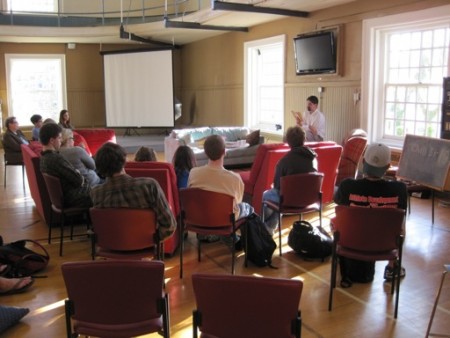
For our fifth annual Classics Marathon, faculty and students gathered on October 28 (from 8 AM to 8 PM) for a public participatory reading of Ovid’sMetamorphoses, a series of variations on the theme of change and a master storyteller’s masterwork.
-
2009: Aeschylus' Oresteia
Aeschylus' Oresteia. 3 Plays. A Whole Lot of Murder. One Evening.
For our fourth annual Classics Marathon, dozens of students and faculty gathered for a continuous staged reading of Aeschylus' Oresteia.
-
2008: Vergil's Aeneid
Vergil's Aeneid. 12 Books. One Day.

For our third annual Classics Marathon, dozens of students and faculty gathered over almost 10 hours to hear and participate in a recitation of Vergil'sAeneid. Professor Mulligan kicked off the event around 11 a.m. with arma virumque cano. An uninterrupted succession of students and faculty followed throughout the day, with reading wrapping up around 7 p.m. Thank you to all who made the day such a moving experience!
-
2007: Plato's Symposium
lato's Symposium. 8 Speeches. A Whole Lotta Love. One Night.

For our second annual Classics Marathon, ten lovers of sophia gathered for a reading of Plato's Symposium. The setting is a party held to honor the tragedian Agathon for his first victorious production. At the outset of the celebration, the participants agree to forego drink (at least for the moment) and to trade a series of speeches on the subject of love and sexual desire. The ensuing speeches are by turns bawdy, lofty, comic, and spiritually moving, and they go on until the late-night intrusion of a drunken visitor transforms the whole gathering.
George Reuter kicked off the event around 4:30 p.m. and our discussion of love and wisdom wrapped up around 7:30. Thank you to all who made the event such a rousing success!
Cast of Characters
Apollodorus: narrator of the dialogue. He heard the story of the symposium from Aristodemus.
George ReuterA Friend of Apollodorus
Ravi SharmaPhaedrus: handsome companion of Socrates who suggests that guests should speak about love.
Bret MulliganPausanias: lover of Agathon.
Andrew SmithEryximachus: a rather pompous doctor, who is insistent on maintaining order at the symposium.
Peter BarishAristophanes: a famous comic playwright.
Willy LebowitzAgathon: an important tragedian who is celebrating his first victory in dramatic competition; young, beautiful, and clever with words.
Evan RodriguezSocrates: the famous philosopher and protagonist in most of Plato’s dialogues; here a bit of a flirt, although unswayed by sexual advances and alcohol.
Aryeh KosmanDiotima: a woman from Mantinea who taught Socrates about Love.
Deborah RobertsAlcibiades: one of the most notorious and charismatic leaders of Athens. Brilliant but amoral, he is here a friendly drunk with a strong attraction for Socrates.
Jacob Carroll -
2006: Homer's Odyssey
Homer's Odyssey. Ten Years Lost. 108 Suitors. 12,110 Lines. One Day.
For our inaugural Classics Marathon, over a hundred students and faculty gathered over almost 12 hours to hear a recitation of Homer's Odyssey. Professor Roberts kicked off the event around 8:30 a.m. with a rousing reading of the proem in Greek. An uninterrupted succession of students and faculty followed throughout the day, with reading wrapping up around 7 p.m. Thank you to all who made the day such a rousing success!
Latin Play
-
2016: Terence's The Eunuch
This year's LATIN PLAY, The Eunuch by P. Terentius Afer (more commonly known as Terence)was held on Tuesday, April 12th in Haverford’s Stokes Auditorium at 8pm (runtime about 75 minutes). The Eunuch is a raucous comedy — centered on a lad who disguises himself as a eunuch in order to be near the girl he loves — with prostitutes, sycophants, braggart soldiers, wiley slaves, and surprise reunions of long-lost siblings. The dramatic reading in Latin featured supertitles projected in English.
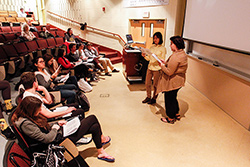
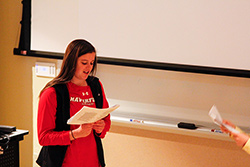
Allie Gibbons '19
Margaret Stretcher '18
Paul Breitenfeld '19 and Margaret Stretcher '18
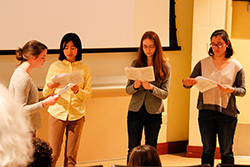
Isabel Agnew '17, Rosalind Xu' '18, Anna Mayersohn '17
Photos by Rae Yuan '19.
-
2015: Plautus’s Casina
Plautus’s Casina, ca. 185 BCE
This ancient Roman comedy tells the story of Casina, a girl abandoned as an infant, and raised as a servant in the wealthy household of Lysidamus and Cleostrata. When the girl comes of age, Lysidamus and his son both fall in love with her and concoct plans to marry her to their personal servants in order to have sexual access to her. Cleostrata is determined to foil her husband’s plan.
Titus Maccius Plautus wrote over 100 comedies, 20 of which survive. He was a major influence on the subsequent development of comic theater, especially Shakespeare.
It was performed in Latin (with subtitles projected) by the students in the Roman Comedy course (Latin102).
- 2014: Terence's Adelphoe
- 2013: Plautus' Miles Gloriosus
-
2012: Plautus' Menaechmi
The Menaechmi (or The Two Menaechmuses) is a comedy about mistaken identity, involving a set of twins, Menaechmus of Epidamnus and Menaechmus of Syracuse. When they meet, zaniness ensues! Translated by our own Prof. Robert Germany!
- 2011: Plautus' Rudens
-
2010: Plautus' Pseudolus
On April 20th, 2010, students of Prof. Germany's intermediate Latin class performed his translation of Plautus' Pseudolus.
- 2009: Plautus' Menaechmi


